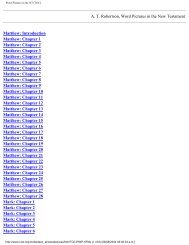Commentary on Joshua - Keil & Delitzsch - David Cox
Commentary on Joshua - Keil & Delitzsch - David Cox
Commentary on Joshua - Keil & Delitzsch - David Cox
You also want an ePaper? Increase the reach of your titles
YUMPU automatically turns print PDFs into web optimized ePapers that Google loves.
<strong>Keil</strong> and <strong>Delitzsch</strong> <str<strong>on</strong>g>Commentary</str<strong>on</strong>g> <strong>on</strong> the Old Testament<br />
to their tribes, families, households, and men, that the guilty men might be discovered<br />
by lot; and to burn whoever was found guilty, with all that he possessed. niqªrab<br />
(OT:7126), "to come near," sc., to Jehovah, i.e., to come before His sanctuary. The<br />
tribes, families, households, and men, formed the four classes into which the people<br />
were organized. As the tribes were divided into families, so these again were<br />
subdivided into houses, comm<strong>on</strong>ly called fathers' houses, and the fathers' houses again<br />
into men, i.e., fathers of families (see the remarks <strong>on</strong> Ex 18:25-26, and by Bibl.<br />
Archaeology, §140). Each of these was represented by its natural head, so that we<br />
must picture the affair as c<strong>on</strong>ducted in the following manner: in order to discover the<br />
tribe, the twelve tribe princes came before the Lord; and in order to discover the<br />
family, the heads of families of the tribe that had been taken, and so <strong>on</strong> to the end,<br />
each <strong>on</strong>e in turn being subjected to the lot.<br />
For although it is not distinctly stated that the lot was resorted to in order to discover<br />
who was guilty, and that the discovery was actually made in this way, this is very<br />
evident from the expressi<strong>on</strong> 'asher-yilªkªdenaah ( which the Lord taketh ), as this was<br />
the technical term employed, according to 1 Sam 14:42, to denote the falling of the lot<br />
up<strong>on</strong> a pers<strong>on</strong> (see also 1 Sam 10:20). Moreover, the lot was frequently resorted to in<br />
cases where a crime could not be brought home to a pers<strong>on</strong> by the testim<strong>on</strong>y of eyewitnesses<br />
(see 1 Sam 14:41-42; J<strong>on</strong>ah 1:7; Prov 18:18), as it was firmly believed that<br />
the lot was directed by the Lord (Prov 16:33). In what manner the lot was cast we do<br />
not know. In all probability little tablets or potsherds were used, with the names<br />
written up<strong>on</strong> them, and these were drawn out of an urn. This may be inferred from a<br />
comparis<strong>on</strong> of Josh 18:11 and 19:1, with 18:6,10, according to which the casting of<br />
the lot took place in such a manner that the lot came up ( `aalaah (OT:5927), Josh<br />
18:11; 19:10; Lev 16:9), or came out ( yaatsaa' (OT:3318), Josh 19:1; 17:24; Num.<br />
33:54 ). bacheerem (OT:2764) hanilªkaad (OT:3920), the pers<strong>on</strong> taken in (with) the<br />
ban, i.e., taken by the lot as affected with the ban, was to be burned with fire, of<br />
course not alive, but after he had been st<strong>on</strong>ed (v. 25).<br />
The burning of the body of a criminal was regarded as heightening the punishment of<br />
death (vid., Lev 20:14). This<br />
http://207.44.232.113/~bible/comment/ot/k&d/josh/jos37.html (2 of 3) [13/08/2004 01:17:25 p.m.]
















